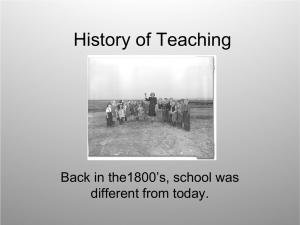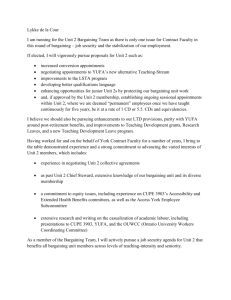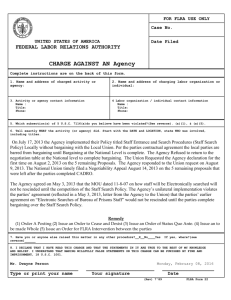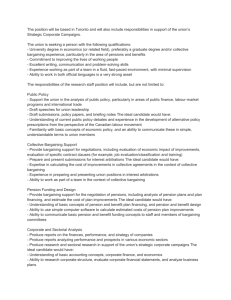DRAFT Better Bargaining Australian workers deserve a unified
advertisement
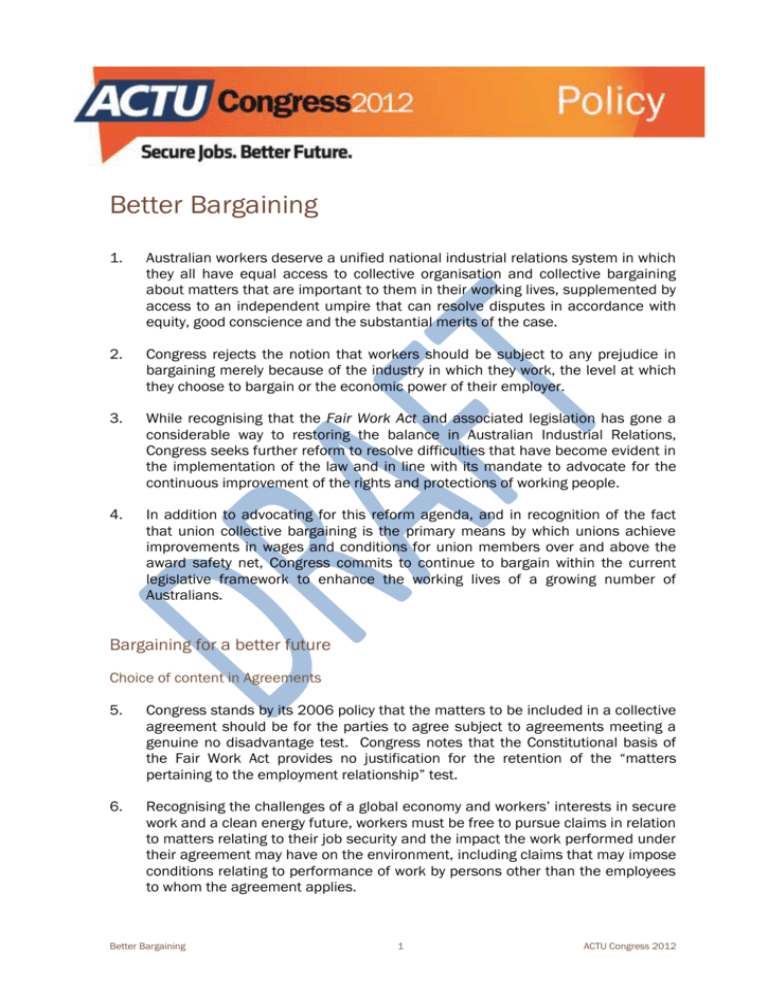
Better Bargaining 1. Australian workers deserve a unified national industrial relations system in which they all have equal access to collective organisation and collective bargaining about matters that are important to them in their working lives, supplemented by access to an independent umpire that can resolve disputes in accordance with equity, good conscience and the substantial merits of the case. 2. Congress rejects the notion that workers should be subject to any prejudice in bargaining merely because of the industry in which they work, the level at which they choose to bargain or the economic power of their employer. 3. While recognising that the Fair Work Act and associated legislation has gone a considerable way to restoring the balance in Australian Industrial Relations, Congress seeks further reform to resolve difficulties that have become evident in the implementation of the law and in line with its mandate to advocate for the continuous improvement of the rights and protections of working people. 4. In addition to advocating for this reform agenda, and in recognition of the fact that union collective bargaining is the primary means by which unions achieve improvements in wages and conditions for union members over and above the award safety net, Congress commits to continue to bargain within the current legislative framework to enhance the working lives of a growing number of Australians. Bargaining for a better future Choice of content in Agreements 5. Congress stands by its 2006 policy that the matters to be included in a collective agreement should be for the parties to agree subject to agreements meeting a genuine no disadvantage test. Congress notes that the Constitutional basis of the Fair Work Act provides no justification for the retention of the “matters pertaining to the employment relationship” test. 6. Recognising the challenges of a global economy and workers’ interests in secure work and a clean energy future, workers must be free to pursue claims in relation to matters relating to their job security and the impact the work performed under their agreement may have on the environment, including claims that may impose conditions relating to performance of work by persons other than the employees to whom the agreement applies. Better Bargaining 1 ACTU Congress 2012 7. The ACTU accordingly calls for the “permitted matters” restriction to be replaced in favour of a general requirement the enterprise agreements contain “terms regulating relations between employers, workers and their representatives and their social, economic or employment interests”. 8. To the extent that any other legislation might limit the types of claims this policy advocates for, such legislation should be amended to unambiguously give primacy and full effect to collective agreements negotiated under federal industrial relations laws. 9. The ACTU and affiliates will lobby Federal and State governments to work together to amend the Fair Work Act and State referral legislation to expressly permit the federal system including Fair Work Australia to deal with all public sector employment matters that State governments have argued are subject to constitutional limitations, such as job security and staffing levels. 10. Consistent with principles of free bargaining, a robust safety net and an independent umpire, bargaining representatives should be free to agree on workplace consultation, representation and unfair dismissal protocols between workers, unions and the employer that best suit their respective needs. In this context: a) The statutory entry rights for permit holders and the statutory unfair dismissal procedure should be considered minimum standards to be built upon in bargaining and the legislation should not restrict this. b) The model consultation and dispute resolution terms provided in legislation must at a minimum also require meaningful consultation and disclosure of relevant information concerning proposed changes to job descriptions, proposed outsourcing or proposed changes to the legal or operational structure of an employer’s business before a final decision and associated third party commitments have been made. c) To complement this and provide for effective dispute settlement during the operation of collective agreements, the model dispute resolution procedure must become a default position and require merits arbitration of all disputes arising while a collective agreement is in operation, including disputes in relation to “reasonable business grounds” to refuse workers’ requests to access NES entitlements and other discretionary decisions. Choice of parties to Agreements 11. Consistent with the principle that parties should be free to determine the level at which they bargain, bargaining for multiple employer agreements should involve the same rights, processes and facilitation from Fair Work Australia as apply to single employer agreements in all cases where: a) there is agreement to bargain by the employers concerned; or b) there is majority support from their collective workforce subject only to a simple ‘public interest’ test. Better Bargaining 2 ACTU Congress 2012 12. Unions and employers should be free to agree to extend an agreement from another enterprise in the same industry to apply to them where FWA is satisfied this is not contrary to the public interest, or to reach agreements in terms that apply to a particular class of work performed for the benefit of a particular business, irrespective of the chain of supply, labour hire or other contracting and employment arrangements that are utilised by that business. 13. The legislation should provide for Industry Consultative Councils to support such industry level negotiations and the development of industry level framework agreements. Fair flexibility 14. Whilst bargaining can deliver agreed flexibilities to workers and employers, this must not undermine the collective nature of any agreement reached. 15. Accordingly, it should not be open for individual employers or employees to opt out from a collective agreement, nor should collective agreements be permitted to cover only one employee. 16. Individual Flexibility Arrangements should be optional rather than mandatory and be stand-alone arrangements that do not purport to modify entitlements that exist outside of the collective agreement to which they relate. 17. Persons wishing to negotiate the terms of an Individual Flexibility Arrangement should have a right to seek the assistance of Fair Work Australia and be informed of that right and their right to be represented in doing so. Better support, certainty and participation 18. Congress notes that workers are free to appoint their bargaining representatives. Affiliates are committed to working co-operatively in single bargaining units that represent the collective interests of employees. 19. To facilitate better communication between bargaining representatives and reduce the potential for employer interference and preferential dealing, where notices of appointment of a bargaining representative are completed (i.e. in cases where workers are not relying on the union’s ‘default’ status), it should be a requirement that those notices include the contact details of the bargaining representative being appointed. Employers should be required to circulate all such notices they receive to all bargaining representatives for any proposed agreement. 20. Workers should be made aware via their payslips of the instruments under which they are paid so they are better informed of their rights and better able to participate in dispute resolution. 21. To ensure equal access to collective bargaining for all workers, Competition and Consumer legislation should be amended to permit unrestricted union representation for independent contractors. More broadly, workers should be Better Bargaining 3 ACTU Congress 2012 entitled to representation by their union in all Courts and Tribunals that exercise jurisdiction in work related matters. 22. To assist in bargaining and implementation of agreements, the minimum statutory framework for right of entry must a) Place a positive obligation on employers and occupiers of premises to notify their workforce when union officials will be on site and where they will be located. A standard notice should be provided in the Regulations for this purpose which informs workers that they have a right to participate in those discussions. b) Require the employer/occupier to provide a private room for discussions. c) Forbid observation or monitoring of discussions, including observation or monitoring of the attendance and departure of participants in those discussions. d) Require the employer to facilitate transport for permit holders where the workplace is in a remote location. e) Provide full investigative rights in respect of former employees. f) Not require the giving of notice to access documents relevant to the investigation of workplace safety, irrespective of the class of documents that might be required in the course of that investigation. Fair, simple and democratic rules for industrial action Restoring an effective right to strike 23. Congress notes that the International Labour Organisation (ILO) has described the Fair Work Act’s processes for regulating access to protected industrial action as `excessive’. 24. Legally protected industrial action should be available to workers seeking a collective agreement, without the necessity for a secret ballot. 25. Unions will not take industrial action unless it is democratically endorsed in accordance with their internal processes. However, unions should have optional access to secret ballots supervised by Fair Work Australia or the Australian Electoral Commission free of charge should they so choose, in accordance with a brief timetable and voting method that is appropriate to the particular size, circumstances and wishes of the workers concerned. 26. Irrespective of whether unions utilise internal processes or choose to avail themselves of ballot processes administered by Fair Work Australia or the Australian Electoral Commission, there should be no role for employers other than a positive obligation of non-interference. Better Bargaining 4 ACTU Congress 2012 27. Once protected industrial action is duly authorised, the Act should make it clear that it continues to be authorised and available to all union members irrespective of changes in the size or composition of the workforce seeking to be covered by an agreement. 28. While recognising that the only protected industrial action that employers are permitted to take is a lockout, Congress notes that workers are unduly prejudiced by snap lockouts and as such employers should be required to give 3 clear working days written notice of an intention to lock out their workforce. 29. In line with ILO recommendation 188, international best practice and previous Congress policy, employers should not be permitted to engage replacement labour during periods of protected industrial action. Giving the umpire choice 30. The right to take protected industrial action should not be subject to administrative interference other than in the exceptional circumstances of: a) Threats to life, personal safety or health, or the welfare, of the population or part of it; or b) Significant damage to the Australian economy or an important part of it. 31. In those exceptional circumstances the object of the legislation should be to give Fair Work Australia a discretion to do what is necessary to obviate the identified risk with minimum interference to the union’s capacity to organise its activities and the workers’ right to strike, and allow the bargaining process to continue unless there is no reasonable prospect of agreement being reached. For example, where Fair Work Australia finds that the exceptional circumstances arise substantially from particular employer response action or particular employee response action, and is satisfied that action is disproportionate, Fair Work Australia may choose to suspend or terminate the particular protected action that is giving rise to those exceptional circumstances, while allowing the bargaining and other protected action to continue. In a different case FWA might be satisfied it should terminate all protected action and order a post industrial action negotiation period to precede arbitration of a workplace determination. 32. Fair Work Australia should not be compelled to cancel a union’s industrial campaign as a reward to a significant employer threatening to hold the nation’s economy to ransom, however it should be empowered to order such employer action to cease. 33. Similarly, and to complement the breadth of bargaining endorsed in this policy, engaging in pattern bargaining should not diminish the right to take protected industrial action. Better Bargaining 5 ACTU Congress 2012 34. In line with the principle of accountable discretion underlying this policy, there should be no power to a Minister to terminate protected action. 35. Orders to stop or prevent unprotected industrial action must be the domain of Fair Work Australia in the first instance and Fair Work Australia must have discretion as to whether it issues those orders. 36. No worker or union should be subject to coercive or punitive orders from a Court as a consequence of unprotected industrial action, irrespective of whether an agreement applies to their work or has passed its nominal expiry date, unless Fair Work Australia has first ordered that the industrial action stop, not occur or not be organised. Good faith, fair play and better access to arbitration A genuine voice for all workers 37. Loopholes that permit employers to coerce workers to stop or cease exercising their rights to take protected action must be closed. In particular, employers should be forbidden from evicting workers from employer sponsored accommodation or taking any other action that would directly affect their living arrangements, and should be bound to make proportional payments for work performed in the event of protected action constituted by partial work bans. 38. In any bargaining process, workers have a right to be represented and that right should not be defeated by practical barriers or a voting cohort that does not represent the workers who will ultimately be bound by the agreement. Accordingly: a) For any proposed agreement, where the workforce to be covered by the agreement comprises one third or more of short or long term visa workers, the employer must (as a condition for Fair Work Australia approving the agreement) facilitate an opportunity for the workers to meet and confer with a representative from a union eligible to represent those workers (and any foreign language interpreter if required) within 14 days of the notification time for the agreement. b) In circumstances where the number or identity of the workforce changes significantly within 1 year after an agreement is approved, the workers upon demonstrating majority support should be able to bring forward the nominal expiry date of the existing agreement. Resolving deadlocks 39. The good faith bargaining requirements provide important rights and obligations however there is a need to develop more effective remedies to combat surface bargaining. With this in mind, Congress endorses the following four pronged reform to the Fair Work Act: a) It should be a good faith bargaining requirement that employers facilitate meetings of workers (and any union representative the workers invite) in paid time within 14 days of the notification time for any proposed Better Bargaining 6 ACTU Congress 2012 agreement, to discuss bargaining claims. As with other good faith bargaining requirements, this would operate when there is agreement to bargain or a majority support determination in place. b) It should be a good faith bargaining requirement to refrain from submitting an enterprise agreement to a vote until the bargaining representatives are agreed on that course or bargaining is at an impasse. As with other good faith bargaining requirements, this would operate when there is agreement to bargain or a majority support determination in place. c) Non-compliance with the good faith bargaining requirements must be a basis to object to the approval of enterprise agreements by Fair Work Australia. Where such an objection is proven, the result should be a decision to not approve agreement which is complemented by a suitable bargaining order to progress good faith bargaining. d) There should be access to “first bargaining workplace determinations” for groups of workers that include classes of workers in an enterprise who have not been previously covered by a collective agreement made under the Fair Work Act, or previously covered by a workplace determination. It would complement, rather than be a substitute for, access to arbitration as a consequence of a serious breach declaration. 40. Access to first bargaining workplace determinations would not require resort to any protected industrial action, and would not interfere with rights to take protected industrial action unless/until arbitration had commenced. Access to first bargaining workplace determinations would require as prerequisites: a) A majority support determination that recorded that the proposed agreement included classes of workers in an enterprise who have not been previously covered by a collective agreement made under the Fair Work Act, or previously covered by a workplace determination; and b) A failure to make the proposed agreement (or an agreement with a scope including any of the classes workers identified in the majority support determination) within 90 days from the date of that majority support determination issuing; and c) A failure to make the proposed agreement (or an agreement with a scope including any of the classes workers identified in the majority support determination) following 30 days of compulsory conciliation presided over by Fair Work Australia; and d) Satisfaction by Fair Work Australia that bargaining representatives will be unlikely to succeed in concluding the terms of an enterprise agreement that will be approved by the workers in the immediate future. 41. Arbitration for first bargaining workplace determinations would involve the resolution of disputed claims. First Bargaining workplace determinations would record the agreed terms and the arbitrated resolution of disputed claims and have a nominal expiry date of no longer than four years. Before making a First Bargaining Workplace Determination, Fair Work Australia must be satisfied that it Better Bargaining 7 ACTU Congress 2012 would leave the workers better off overall as compared to the modern award (or award based transitional instrument), and any equal remuneration order or take home pay order, and any over award entitlements customarily enjoyed by those workers. Playing to our strengths 42. While actively campaigning in support of our reform agenda, Congress commits to continuing to ensure the benefits currently available through bargaining under the Fair Work Act are realised for the greatest number of Australian workers. To that end, Congress commits to: a) Use the legislative provisions of the Fair Work Act 2009 to actively pursue collective bargaining across the economy. Unions will seek to bargain at the enterprise level or multi-employer level. b) Where necessary, seek the assistance of Fair Work Australia to achieve agreements, or as a last resort arbitrated wage increases, using special bargaining provisions that facilitate agreement-making for the low paid. c) Pursue low paid bargaining claims in Fair Work Australia including for those covered by collective agreements. 43. Congress commits to carrying out this bargaining agenda in accordance with the following principles: a) A co-ordinated approach to bargaining at the industry level with maximum involvement of delegates and members. b) Priority given to the achievement of equal remuneration for work of equal or comparable value for women. c) Inclusion of claims, consistent with other Congress decisions, for improved hours of work, increased job security, improved conditions for casuals and other workers with precarious employment, better work and family balance, delegates' rights, greater superannuation entitlements, protection and portability of employee entitlements and paid training leave. d) Adequate resourcing of wage increases achieved through collective bargaining in the public sector and the publicly funded not-for-profit sector. e) Wage outcomes that, as a minimum, maintain the real value of wages and which secure a fair share for workers of productivity growth and improved profitability or efficiency. Better Bargaining 8 ACTU Congress 2012
![Labor Management Relations [Opens in New Window]](http://s3.studylib.net/store/data/006750373_1-d299a6861c58d67d0e98709a44e4f857-300x300.png)
